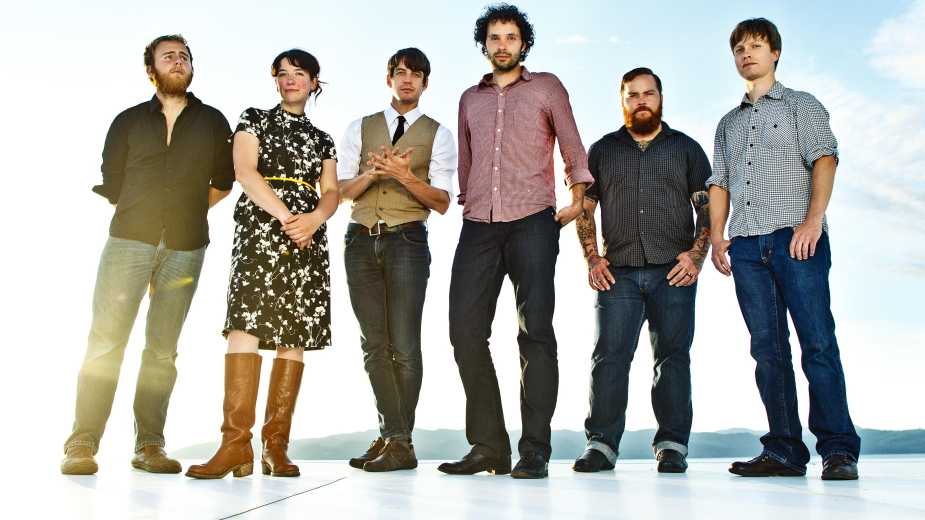
21 Feb Sheridan Opera House: Blind Pilot
Telluride’s Sheridan Arts Foundation presents two nights of Blind Pilot live in concert at the historic Sheridan Opera House on Friday, February 24 and Saturday, February 25, 2017. The SHOW Bar will open at 8 p.m.; show time is 9 p.m. Tickets for each night are $30 GA on the floor; $40 reserved seats in the balcony. (A $4 ticketing fee applies at all sales outlets.) Tickets and information: sheridanoperahouse.com or 970.728.6363 x5, 9 a.m.-5 p.m. Monday through Friday. Go here for a taste of the group’s 2016 release And Then Like Lions.

Blind Pilot is a Portland-based band that strikes a balance between mellow folk and West Coast indie pop. They’ve played the Sheridan Opera House twice before to sold-out crowds, but it’s been four years (and a new album release) since the group last visited Telluride.
Blind Pilot’s And Then Like Lions on ATO Records is the third LP from the sextet: frontman Israel Nebeker; fellow founding member Ryan Dobrowski; Luke Ydstie; Kati Claborn; Ian Krist; and Dave Jorgensen. The album was produced by Israel Nebeker and Tucker Martine (The Decemberists, Neko Case, My Morning Jacket), and written and composed by Nebeker. Lions comes five years after the band’s well-received We Are the Tide and three years after Nebeker thought he would be starting the songs that would become the band’s third release.
Blind Pilot has performed on “Ellen” and “The Late Show with David Letterman,” at the Newport Folk Festival, Bonnaroo, and Lollapalooza. The group has shared stages with The Shins, Local Natives, Andrew Bird, and more. The project began in 2007 when Israel and co-founding member Ryan Dobrowski went on a West Coast tour via bicycle.
Here is a short, sweet bio from Billboard:
Nebeker and Dobrowski first banded together in college before combining their talents and touring the northwestern Oregon circuit. By 2006, however, they’d decided that a change of scenery might help their songwriting. Blind Pilot consequently relocated 90 miles north, where the guys spent three months inside an Astoria warehouse while recording demos for a full-length album. Afterwards, Nebeker and Dobrowski launched a “bike tour” that saw them traveling from Vancouver to San Francisco via their bicycles, playing shows and selling EPs (not to mention saving gas money) along the way. They returned home to finalize their 3 Round and a Sound debut, which was released by Expunged Records in June 2008.
While playing shows in support of 3 Round and a Sound’s release, Blind Pilot added four new members to the touring lineup. This swelled the band’s sound, making 2011’s We Are the Tide a more fleshed-out, lush affair. The group then signed with ATO for their third LP, which would be five years in the making. Still operating as a six-piece, they released And Then Like Lions in the summer of 2016.
And review from NPR of And Then They Like Lions:
It’s taken Blind Pilot five years to release a follow-up to 2011’s We Are The Tide, and the result befits a group that moves at its own pace: And Then Like Lions unfurls slowly and gracefully, its energy directed more toward richness of sound than speed or force. The Portland, Ore., band makes wistful late-summer music — songs of reflection and connection, carried out in a subtle swirl of strings, horns, pianos and voices.
Singer Israel Nebeker has described And Then Like Lions as a reflection on how we connect to the past, but it’s a theme that takes many forms: The slow-building “Umpqua Rushing” channels thoughts on jealousy and regret through references to rivers and forest fires, showcasing Blind Pilot’s gift (heard in “Moon At Dawn” and elsewhere) for conflating personal narratives with the movement of the natural world. In the lightly ambling “Don’t Doubt,” Nebeker offers a bit of advice — “Don’t you doubt / Everybody’s seen the winter / Don’t you take the dark way out” — that seems to bear the weight of experience.
There’s a sense of deliberation to everything Blind Pilot has done in its three-album career: After all, back when the band consisted of just Nebeker and drummer Ryan Dobrowski, the two toured up and down the West Coast via bicycle. Now that it’s a six-piece with a label deal and a national following, Blind Pilot travels more quickly. But it still uses its music as a vehicle for slowing down and examining the world around it.
And from All Music:
Their debut with the ATO label, And Then Like Lions is the long-awaited third LP from indie folk-pop stylists Blind Pilot. Despite the description, they’re not to be mistaken for part of the post-Mumfordcrowd of jamboree makers. Rather, Israel Nebeker and group have stayed anchored to a more reflective, singer/songwriter aesthetic during the five years since 2011’s We Are the Tide. Still operating as six-piece, And Then Like Lions also shares that album’s efficient arrangements, which only occasionally sound like a band of that size. Written by Nebeker in the aftermath of a series of personal traumas, including the breakup of a 13-year romantic relationship and the death of his father (artist Royal Nebeker), the material is, if anything, even less poppy here. Reserved in every way but melodically, “Umpqua Rushing” opens the record with a slow build of varied acoustic and electric members of the guitar family, quiet electronics, and percussion. Inspired by a scenic region of Oregon and how memories and emotion can be tied to a place, it’s an elegant opener, one that signals what’s to come. Another nature-themed entry, “Moon at Dawn,” has the album’s haziest atmosphere, with layers of sustained guitars, backing vocals, horns, and even vibraphone. A brighter selection is “Packed Powder,” with rich vocal harmonies and livelier rhythms that are mirrored later on “Which Side I’m On.” The hopeful campfire ballad “Don’t Doubt” is another track that, though affecting in its own way, balances the tone of the more somber songs. Album standout “What Is Yet” has an over-one-minute-long orchestral intro that leads into a bluesy lament. Both an acoustic guitar-and-banjo tune and a fully arranged chamber piece with strings and horns, it shows what the group has in reserve. The sparser songs here have everything they need, however, and that’s the album’s most impressive feat, even topping memorable melodies: a feeling of stability in the territory of loss.


Sorry, the comment form is closed at this time.